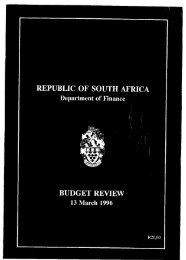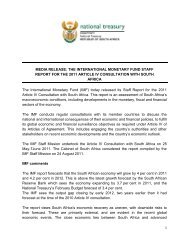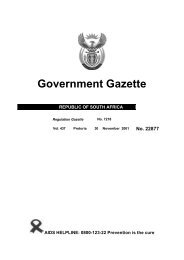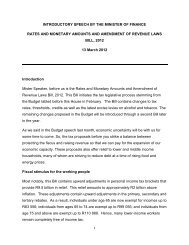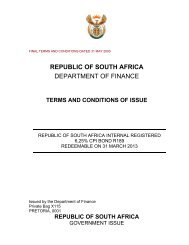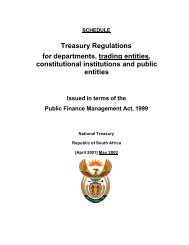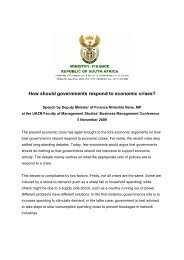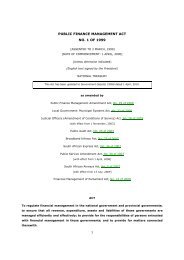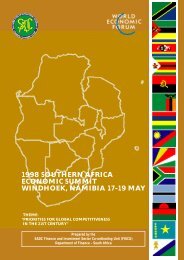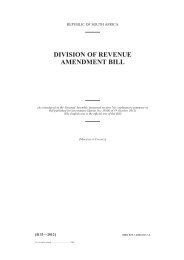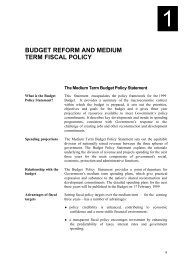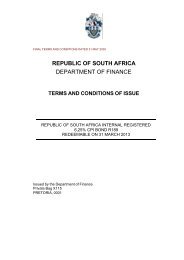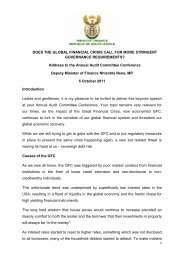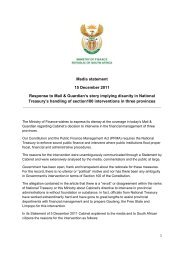Annual Performance Plan Jaarlikse ... - National Treasury
Annual Performance Plan Jaarlikse ... - National Treasury
Annual Performance Plan Jaarlikse ... - National Treasury
Create successful ePaper yourself
Turn your PDF publications into a flip-book with our unique Google optimized e-Paper software.
• Award bursaries/loans to needy learners<br />
• Maintain computer laboratories<br />
• Ensure that all students are trained in ICT<br />
Progress analysis<br />
The current FET curriculum is based on Report 191 (Formal Technical College Instructional Programmes in the RSA) and Report 190 (Norms<br />
and standards for instructional programmes and the examination and certification thereof in technical colleges education). These curriculum<br />
and programme offerings will be replaced in the period to 2008 by a framework that offers 16 - 20 year olds more flexible and responsive<br />
education and training programmes. The framework for FET offers three pathways to the FETC or NQF Level 4 certificates, namely:<br />
General academic<br />
General vocational<br />
Occupational – trade, operational, professional<br />
This means that Report 191 programmes are being phased out gradually and relevant qualifications and programmes are being phased in.<br />
FET colleges have already begun the process of developing new courses and qualifications based on Unit Standards. This programme<br />
development phase was substantially strengthened by the iKapa elihlumayo grant for the development of level 2 to 4 programmes.<br />
As with FET schools, the province will actively drive a process of curriculum redress to ensure that in all districts a wide range of programmes<br />
is offered. This will require careful planning and strong redress action through the re-capitalisation of colleges especially the provision of<br />
workshops and equipment and specialist teaching staff.<br />
Targeted programmes enable educators at colleges to upgrade their mathematical literacy and mathematics skills, integrate theory and<br />
practice, upgrade their academic and professional qualifications, and assess learning to meet Umalusi and SETA standards and deal with<br />
barriers to learning.<br />
Colleges are also developing strategies to broaden access to FET colleges such as:<br />
A variety of delivery modes (e-learning, distance learning, learnerships, skills programmes, etc.)<br />
Facilities and training that meet the needs of differently-abled learners<br />
New sites for the disadvantaged and rural communities<br />
Bursary and loan schemes<br />
The population of 16 – 20 year olds in the Western Cape is 400 000, but only 210 000 or 55% of the population is enrolled at<br />
schools, colleges or adult centres on FET level courses (Grades 10, 11 and 12 or Level 2 to 4 on the NQF). Close on 50% of<br />
learners of any age cohort leave the school system without completing Grade 12 and, with only 20 000 learners in FET colleges, it is<br />
clear that the majority of learners do not see college as an alternative to schools. While socio-economic factors play a significant role<br />
in learners leaving the system, the relevance of the subject offerings and the prospect of the FET qualification leading to employment<br />
are factors that the education system is addressing.<br />
The FET access goals have two dimensions: first to work towards a more equal balance between FET school enrolees and FET college<br />
enrolees; and secondly to increase the number of the population of 16 – 20 year olds in FET institutions. In the medium term this will mean<br />
reducing the Grade 10 - 12 learners to around 160 000 learners and increasing the FET college learners or those enrolled on learnerships<br />
from 20 000 to 60 000 learners by 2014.<br />
Analysis of constraints and measures planned to overcome them<br />
The rate of growth of full-time equivalents (FTE’s) in FET colleges is constrained only by resources e.g. staff, equipment, finance etc.<br />
Indications are that targets will be reached as additional enrolments are recorded in the 2006-year. FET colleges offer courses,<br />
which range from a few hours to years in terms of duration. Learner enrolment is, therefore, ongoing. Audited FTE’s for the<br />
preceding year are only available from April in the subsequent year as these are subject to complex calculations and auditing by<br />
external auditors along with the financial statements of the college concerned.<br />
Colleges have established learner support units to accommodate and provide support for the vast variety of learners with different<br />
learning backgrounds and experiences. Tracking of learners internally will be done to support learners in curriculum and work<br />
placement.<br />
The credibility and value of qualifications achieved at FET colleges will depend on the quality of their programme offering. Colleges<br />
will develop and apply quality management systems in order to measure and improve the quality of academic programmes and nonacademic<br />
processes.<br />
<strong>Annual</strong> <strong>Performance</strong> <strong>Plan</strong> 2007/08 – 2009/10<br />
62



